Advertisement
Is Boston Hostile To Hip-Hop?
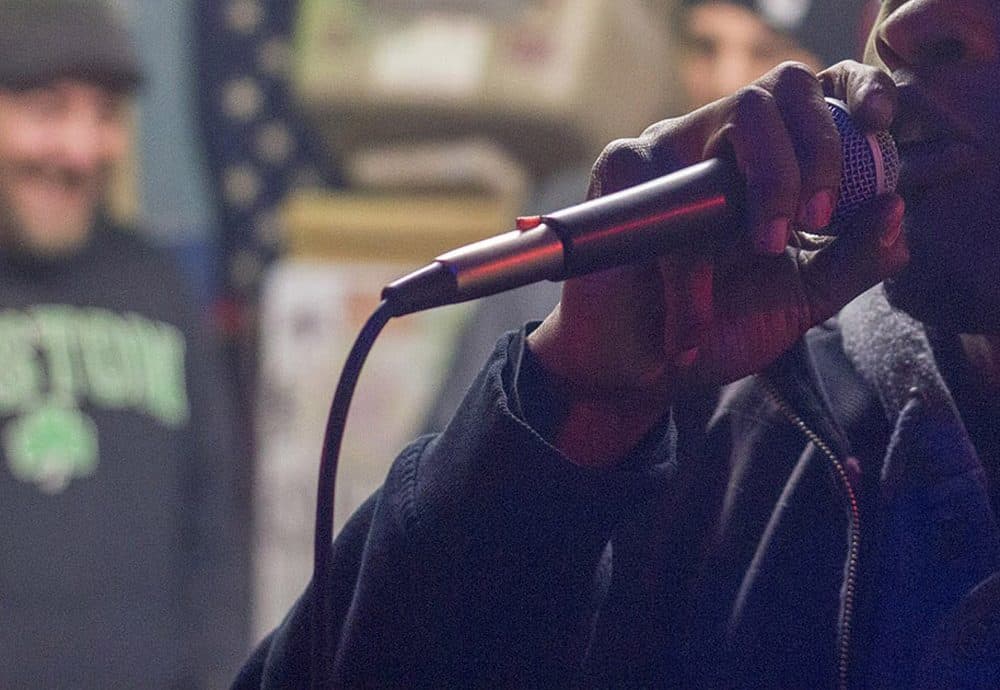
2017 was a good year for hip-hop. For the first time in history, the media research company Nielsen reported that R&B/hip-hop had overtaken rock as the most-consumed music genre in America. The rappers Jay-Z and Kendrick Lamar led a hip-hop and R&B-heavy crop of topline Grammy nominees — a notable development for the awards, which had in the past faced criticism for overlooking rap.
But Boston's local hip-hop community was telling a different story, one that had long been brewing. It first bubbled forth in May, in the form of a viral Facebook post by the Boston rapper Moe Pope, who took the New England Music Awards to task for eliminating its hip-hop category. He saw the move as a reflection of the many ways rappers were sidelined in the city, most notably by venues hesitant to book hip-hop.
"Our art is just seen as less than," Pope said in a recent interview. "It’s not highlighted, it’s not revered, it hasn’t been in the city for my whole career, you know. And we have to fight for every little bit that we get."
"Our art is just seen as less than. It’s not highlighted, it’s not revered, it hasn’t been in the city for my whole career, you know. And we have to fight for every little bit that we get."
Moe Pope
In June of last year, a community forum was convened. Hosted by promoter Lisa Finelli, of the agency Xperience Creative, and titled “Boston Music State of the Union: Genre Equality,” the discussion panel featured many fixtures in the Boston music scene, including Pope. The panelists described a city that routinely shut rap out of venues and saddled it with a reputation for violence. They saw hip-hop suffering from lack of opportunity and institutional support.
The disparity was undeniable to promoters like Finelli. “How is it easier for me to book shows in New York City than in Boston?” she said in an interview over the summer. “My home is here. I work with artists here. But I don't have the same access here as I do there.”
Shut Out Of Venues
The most oft-cited barrier for hip-hop artists in Boston is the dearth of venues willing to book them. Though larger clubs, like House of Blues and Paradise, feature big name, out-of-town hip-hop acts on a regular basis, smaller venues skew heavily toward rock, and some never book hip-hop at all. Only the Middle East in Cambridge is known to feature a significant percentage of hip-hop on its calendar. With limited options for places to play, local hip-hop artists starting out in Boston find it difficult to gain traction.
Nearly every one of the 10 artists and promoters interviewed for this article said they had been denied potential gigs by venues whose policy it was not to book hip-hop.
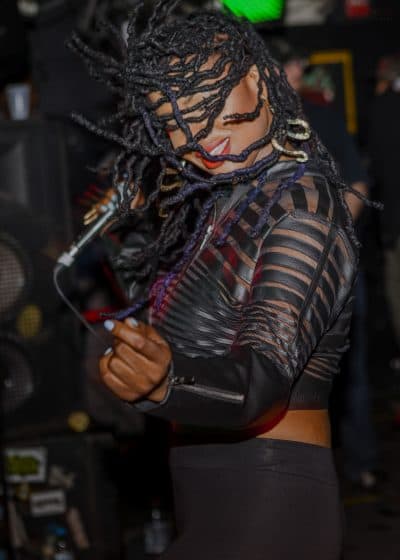
The Boston rapper Dutch ReBelle said she had faced skepticism from clubs and talent buyers throughout her career. "If I'm going to bring hip-hop artists to a certain venue, there's always resistance," she said. "'We're trying not to book much hip-hop' — that's usually how it's said."
Mark Merren ran a weekly hip-hop series called Motivate Monday for five years starting in 2011, first at the now-defunct Church of Boston and later at Hard Rock Cafe. Finding a good venue with decent sound and regular availability was tough enough, he said, and sometimes the notion of an all-rap lineup was met with resistance. “There were a few venues that blatantly didn't book hip-hop shows — and/or you kinda had to mask it,” Merren said. “They'll say ... you got to have a live music element — have bands play, and then kind of mix in the hip-hop.”
Similar stories abound. Pope said he had been turned away from venues numerous times. “[The response is] ‘We don't book hip-hop. We don't do that.’ And some of the newer ones are even more blatant about what they mean by that. ‘Cause they're not meaning they won't book hip-hop. They won't book me doing hip-hop,” said Pope, who is black.
Advertisement
Pope declined to name specific venues, citing fear that he could further damage his ability to get gigs around town. Few venues openly advertise such policies. T.T. the Bear’s Place, which shuttered its doors in 2015, was open about its stance, stating on its website, “We book a variety of music but do not book hiphop, extreme metal or hardcore punk.” (T.T.’s space has since been resurrected as Sonia by the owners of the abutting Middle East Restaurant and Nightclub, which regularly features hip-hop on its schedule.)
According to reports by Wicked Local Somerville, when Thunder Road in Somerville was applying for a liquor license in 2014, the city’s licensing commission expressed concerns about noise and security at the venue, citing issues at the location’s former establishment. In response, Thunder Road co-founder Dan Millen promised not to book "loud" or "dangerous" music.
This, according to some, translated into a ban on rap. Heather Mack, of the hip-hop duo Solo Sexx, emailed Millen in May of 2015 asking for a slot at the club. “Great stuff but unfortunately doesn’t fit with our vibe and we can’t do hip hop shows at Thunder Road, the city and neighborhood have indicated they aren’t into it,” Millen wrote in reply.
Mack, who is white, attributed the policy to racism. “The coded language is ... ‘We don't book hip-hop,’ aka, ‘We don't want people of color coming and performing,’ ” she said.
"We don't book most styles of hip hop, but we also don't book heavy heavy metal or mosh pit style acts either, and we don't do EDM style or club style dance nights."
Thunder Road's Dan Millen
Millen defended his club’s policy in an email. “We don't book most styles of hip hop, but we also don't book heavy heavy metal or mosh pit style acts either, and we don't do EDM style or club style dance nights,” he wrote. “I can tell you that for us, it's absolutely not any kind of racial bias. The bands we book feature members of all different races, sexual orientations and political views. We have a vibe we are going for that is primarily roots rock and straight up rock n' roll and BAND based.”
It’s possible that Thunder Road has simply been more open about a booking policy that appears to be followed by many small music venues in the area. Bars like Great Scott and O’Brien’s Pub in Allston and the Lizard Lounge, Toad and Atwood’s Tavern in Cambridge all book almost exclusively rock-based acts. Both Great Scott and O’Brien’s regularly feature punk and metal.
“Certain venues have a certain aesthetic,” promoter Mark Merren said. “Like, the Midway Cafe [in Jamaica Plain] is more known for supporting local bands. Live music, and bands — not DJs with rappers just rapping.” Merren threw a few shows at the Midway, but said in the end the venue simply wasn’t a great fit. Midway booking agent Nick Blakey — who worked as a talent buyer at Church during the Motivate Monday era — confirmed this characterization. “We tried it," he said. "It just doesn't really work."
In the last year, hip-hop presenter the New Era of New England, or NEONE (pronounced "anyone"), was turned down by at least three venues, according to Marquis Neal, one of the organization's founders. (Neal is also a business associate of Dutch ReBelle and, in his day job, serves as technical director of WBUR's and NPR's Only A Game.)
NEONE was founded in 2016 by Neal and two fellow promoters. The group sought to distinguish itself among the city's small number of independent live music presenters with a quarterly series called The Pull Up that was focused on up-and-coming local rappers, many of whom boasted a growing online fanbase but little performance experience. NEONE presented two installments of the series in the fall of 2016 and winter of 2017 at the Middle East in Cambridge. It didn't take long for the event to start attracting buzz, and The Pull Up was even profiled in the Metro, which credited the nascent series with providing "a new stage for Boston hip-hop."
But the momentum was short-lived. When NEONE attempted to secure a date for the third Pull Up, the Middle East turned them down. In a text message shared with The ARTery, Ned Wellbery, then the venue's booking manager, told Neal that the Middle East was cutting back on hip-hop "for a while" due to concerns about security. (Wellbery declined to comment on the record in regards to the incident.)
Over the course of the past year, NEONE struck out with three different venues. An email inquiry to Great Scott in Allston elicited no response. Brighton Music Hall rejected the organization's proposed lineup, citing security concerns, and the Lilypad in Cambridge told the group it was not booking hip-hop artists — exchanges that were corroborated in emails shared with The ARTery. NEONE was at last able to land a date at ONCE Somerville for the end of March — more than a year after the group first began looking for a new venue.
Brighton Music Hall's talent buyer Lance Tobin declined to comment on the record about the reason for turning down NEONE. A publicist for Bowery, which handles the majority of Great Scott's programming, guessed that the group's inquiry had simply been missed, writing via email, "Of all Bowery's venues, Great Scott receives an overwhelming volume of inquiries from artists and bands hoping to perform because it’s a 200 person capacity room. They try really hard to get back to everyone in a timely fashion, but unfortunately some fall through the cracks."
"I understand that there's a fine balance," said Neal, expressing sympathy for the safety concerns of clubs that had turned them down. But after numerous refusals, he saw a pattern that to him spelled bias.
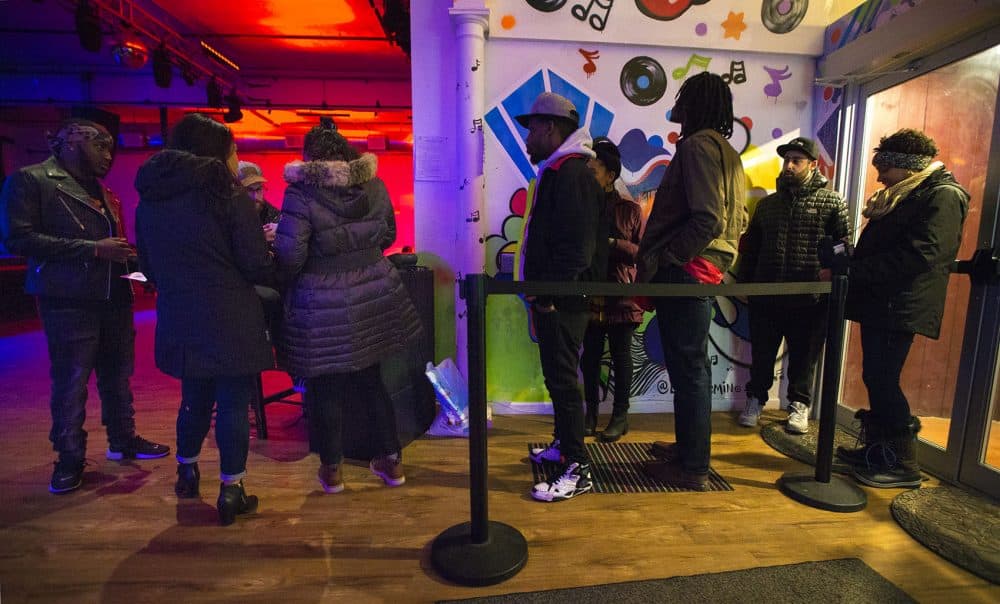
Josh Bhatti, who oversees the Boston office for the booking platform Bowery Presents, said that the dearth of local hip-hop at Bowery-booked venues was due largely to a lack of supply. (Bowery Presents owns and operates The Sinclair in Cambridge, maintains an exclusive booking contract with the Royale in Boston, books national touring acts at Great Scott in Allston and works with a number of other venues in the area.) "There's not a lot of local acts, regardless — even if you're looking at it from a rock perspective," he said. He estimated that hip-hop constituted about 10 to 15 percent of Bowery's bookings in Boston, most of them touring acts. But he expected those numbers to go up, adding, "I think overall — nationwide and throughout other Bowery venues and the industry as a whole — I think there's a bit of a rebirth of hip-hop at the club level."
But members of Boston's hip-hop community told a different story: The supply was there, it had just been forced underground. "We got kids that are 19 and 20 doing basement shows — that s---'s not safe," Neal said.
"Sneaker shops, clothing boutiques, pop-up shops," said Francisco Peguero, aka Noel Pancho, who got his start nearly a decade ago performing in just such settings. "It was that, and then the one or two places you could get into, like the Middle East."
The Only Option In Town
The cluster of venues in Cambridge's Central Square owned by Joseph and Nabil Sater, which includes the Middle East Downstairs, the Middle East Upstairs, the Middle East Corner, Zuzu and Sonia, is the city's most reliable platform for both local and out-of-town rappers. In the month of December 2017, for instance, 11 out of 29 concerts (38 percent) listed on the Middle East Upstairs calendar included hip-hop acts, beating out the similarly-sized Great Scott in Allston (two out of 23, or 9 percent) and Thunder Road and ONCE Somerville, neither of which featured hip-hop in December. (ONCE does occasionally host hip-hop, though only "a very low percentage," according to proprietor JJ Gonson, who attributed the club's rock leanings partly the tastes of its staff, who have helped make it a destination for metal.)
The Middle East's hospitableness toward hip-hop is due largely to the efforts of Ned Wellbery, who oversees management of the Sater's venues. Since 2004, Wellbery has been booking local and touring hip-hop acts in the Boston area through his agency Leedz Edutainment, and most of the hip-hop shows at the Middle East and its associated venues are presented by his company. The Middle East remains the most popular place for established local rappers to perform. Aspiring artists can sometimes buy their way onto a Leedz Edutainment bill as opening acts by purchasing tickets upfront and selling them to friends and fans. (The practice, called "pay to play," is employed by promoters of many genres in the Boston area; Wellbery is the most prominent hip-hop booker to make use of it.) "I need to make sure whoever's opening up is going to bring a crowd," Wellbery said. "Certain shows require that to make them work."
But several artists criticized this "pay to play" policy, calling it a "scam" that mostly targets teenagers and puts artists at risk of losing money. "It's definitely a predatory practice that is harmful," said Mack, arguing that opening acts on such bills rarely received any promotion. And Pope said he preferred not to perform at the Middle East because of his dislike of the practice, despite feeling grateful for the opportunities Wellbery had provided him in the past. "You want to rock a show at Middle East Downstairs, you're going to have this thing attached to it where you feel dirty," he said. "I don't want to do that."
"I felt like I was getting set up for failure."
Marquis Neal
And, despite the Middle East's primacy in the local hip-hop circuit, local promoters still sometimes encounter scrutiny from venue management. "If I want to just do my own show at the Middle East then I'm going to have to go through so many loopholes and double-checking my lineup and this and that," Neal said. He recalled that only a week or so before NEONE's second Pull Up event at the Middle East, he was asked to pull two artists from the bill due to security concerns. In the end the parties reached a compromise in which the lineup was left intact and the concert was moved to the easier-to-secure, but larger and more expensive Middle East Downstairs. Still, Neal said, "I felt like I was getting set up for failure." (Wellbery declined to respond on the record.)
It is possible, too, that Wellbery's own company, Leedz Edutainment, enjoys an advantage when it comes to securing slots at the Middle East. "I think it's a conflict of interest," Neal said, "for the venue manager to also be the venue's hip-hop promoter."
Branded A 'Security Risk'
Local artists and promoters say that hip-hop struggles against a reputation for being more dangerous than other genres. According to Lisa Finelli of Xperience Creative, clubs sometimes charge more for the room to cover beefed-up security costs — in many cases making the venue inaccessible. “I've tried to book stuff in Providence and Boston that was considered ‘high risk,’ and the increase in fees rose from anywhere from $250 to $500,” she said. “That could be my entire profit for a show.”
Josh Bhatti, of Bowery Boston, said he has encountered perceptions that hip-hop presents a greater security risk than other genres. He attributed that reputation in part to the fact that fans of emerging hip-hop acts seem to skew younger than fans of emerging indie-rock acts. “I think a younger show, you tend to do pat-downs and bag checks more vigorously than you do for an older show," he said.
But Finelli sees the stigma encountered across the spectrum of hip-hop acts. “Sometimes you do need extra security, based on who the artists are,” she said. “But I book mostly ‘90s hip-hop artists. My crowds and my audiences skew a little older. And I'm very proud to say I've only had one show in my entire career with Xperience Creative that had one physical altercation. ... So we're constantly coming up against this issue of, ‘Well, we don't really want that crowd here. We don't really want those type of people here.’ ”
Excessive pat-downs are a common complaint among hip-hop artists, promoters and fans. “We're getting patted down for what — weed? People don't really bring weapons to the show anymore,” Pope said. “That being said, aren't punk shows and metal shows just as dangerous?”
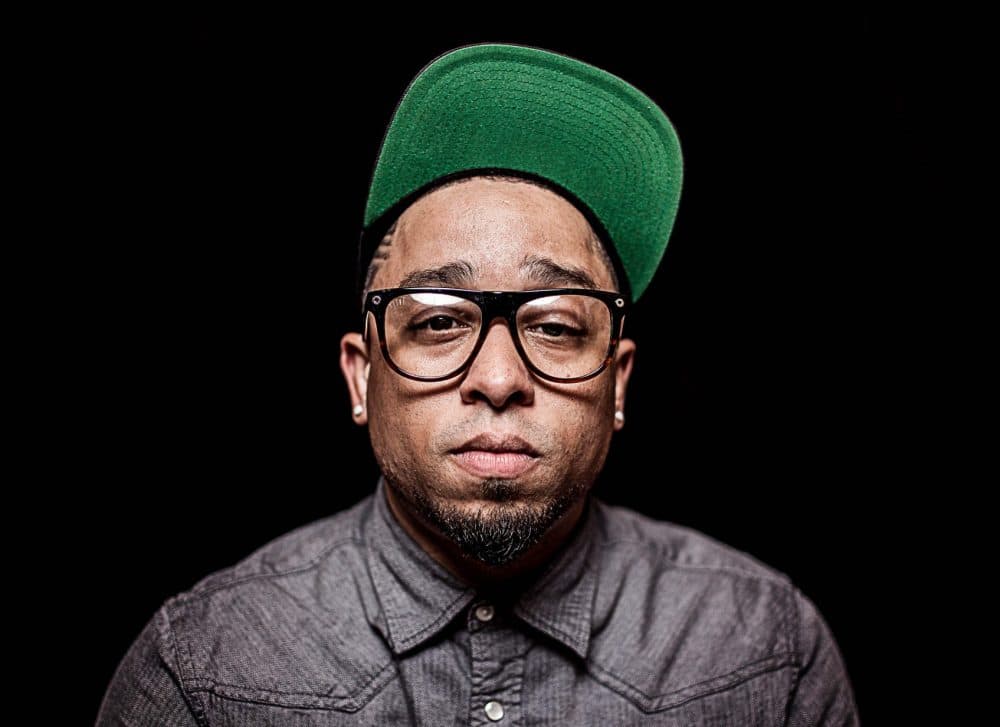
Mack singled out the Middle East in Cambridge. “Their hip-hop shows are way more heavily policed and patted-down than other shows I go to there — like very invasive pat-downs when it happens to be a hip-hop show,” she said.
But Wellbery defended the Middle East’s policies. He said that early in his career, problems at some of his shows prompted him to double down on security. “I had to get stricter,” he said. “We had to do pat-downs. We had to make sure the backstages were not too full, we had to make sure the exits were clear.” Now, “most big shows in the Downstairs [at the Middle East] are pat-downs.”
Yet Wellbery remembers times in his career as a hip-hop promoter when he faced resistance from venues reluctant to feature rap. "There was a lot of scrutiny around it, a lot of fear around it," he said. At least one venue went so far as to cancel a show preemptively out of what the promoter believes were unwarranted concerns about security. Others have similar stories. “I've seen ... very successful events, that are violence-free, that have no issues, and those events are cancelled,” Finelli said. “I've literally seen venue owners walk in and pull the plug out of the wall and stop events.”
Promoters said that their concerts sometimes seemed to attract increased police presence, which could make venues skittish. “What does that say when you have a cop standing outside of a music show?” Pope said. “What does that say to the people going to that show? And what does that say to the artists in that show?”
Wellbery believes that extra precaution is necessary for certain artists. "If a stabbing or a shooting goes down, a venue is under huge scrutiny and could possibly get shut down or penalized," he said. But he warned against painting the entire hip-hop scene with too broad a brush. He pointed out that stage diving is a huge a liability for venues, but said that artists whose crowds are prone to such behavior — usually punk or rock bands — don’t have to contend with the stigma that rappers do. “If it is a dangerous hip-hop act and it's going to cause a problem, they probably shouldn't be booked,” Wellbery said. “But you don't want to hold that against a whole culture, you know. You hold it against a whole culture, that's not fair.”
In fact, it may be local artists, especially those lacking in money or clout, who bear the brunt of such bias. Neal recalled getting turned down by Brighton Music Hall on the basis of safety concerns when he approached them about booking the Cambridge rapper Millyz — only to later discover that Millyz was allowed to open for the New York rapper Dave East. When Neal inquired with the venue, he was told that Millyz had been booked as a supporting act through East's manager. (These exchanges were corroborated in emails shared with The ARTery; Brighton Music Hall's talent buyer Lance Tobin declined a request for comment.)
"Think about that," Neal said. "The best way to get on a show in Boston is to have a direct link with the manager from another artist from outside the city?"
To the promoter, it seemed as though venues were reluctant to book certain kinds of hip-hop artists — especially those associated with the popular style known as trap, which finds its roots in drug-dealing culture — that managers and talent buyers believed would draw a dangerous crowd. But there appeared to be an exception when it came to buzzy touring acts, ones that were "potentially making the venue money."
The attitude, Neal said, stemmed from ignorance. He believed that if venue managers knew the scene like he did, they wouldn't be worried about the artists he was bringing in. "I'm from Dorchester," he said. "I know these kids. There's no disconnection, there's no security concerns. Because if you're connected and you're paying attention to what's going on, you know that you don't really need to have security if you're doing what you need to do, and if you have the right relationships with the right people."
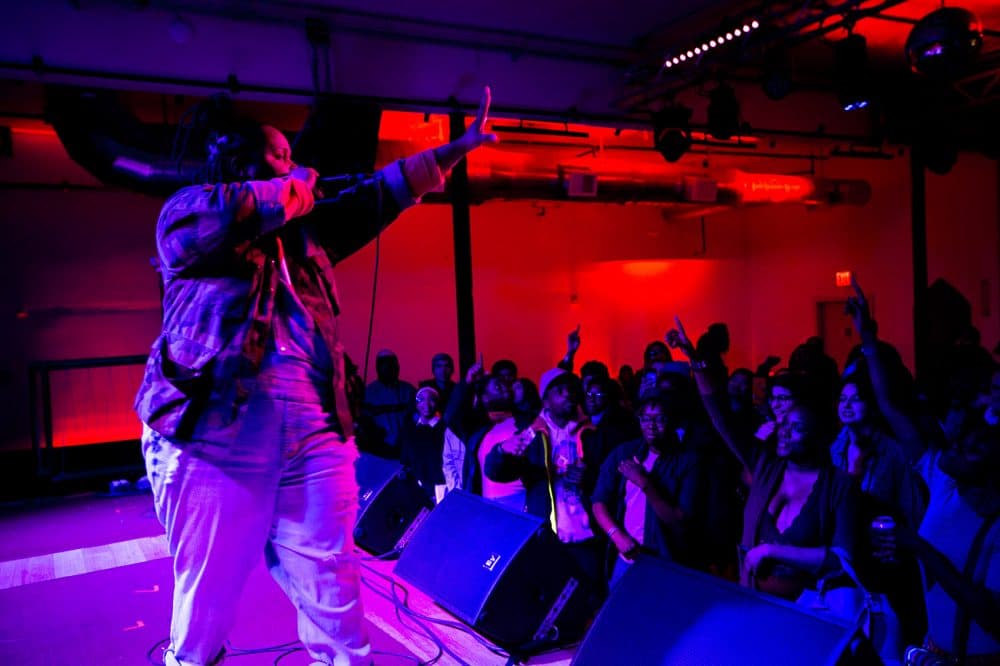
Burdened By History
It may be possible to trace hip-hop’s reputation to its troubled adolescence in Boston. In the early days, young emcees and DJs performed at schools, radio shows and block parties — gatherings that tended to be below-the-radar and peaceful. But as the genre’s popularity, and thus commercial potential, grew, tensions within the scene increased.
"The '90s was a very violent time," said Cindy Diggs, who started promoting rap shows in Boston during the underground hip-hop boom of the 1990s. She recalled that nightclub shootings were a common occurrence. In 1995, fed up with the violence in the scene as well as the lack of hip-hop-friendly venues, Diggs founded Us Making Moves Forever, or UMMF, a hip-hop networking organization that eventually grew to include 500 members. UMMF helped connect artists with industry support, published a newsletter and let fans know about local shows. "We ... got people to learn how to network with one another and not look at one another so much in a violent way or neighborhood beef way, but as fellow artists," Diggs said. Still, she struggled to find clubs that were willing to book the rappers in her network.
The advent of gangsta rap put hip-hop on the radar of the police and contributed to the perception that the genre was inherently violent. It all came to a head in Boston in 1992 when hometown group The Almighty RSO released “One in the Chamba” on Tommy Boy Records. The song decried police brutality and harassment of African-Americans and advocated carrying a gun for protection. It became a flashpoint in a national debate around gangsta rap’s messaging and prompted the Boston Police Patrolmen’s Association to threaten Tommy Boy with a suit. The Almighty RSO was soon dropped from the label.
People say the ripple effects from hip-hop's turbulent past are still felt in the Boston scene. "There's these little stories that people know,” said the rapper Noel Pancho. He pointed to an incident at a Ruff Ryders/Cash Money concert at the FleetCenter (now TD Garden) in 2000, in which several people were stabbed during a backstage altercation. Even 18 years later, “people try to use it as the reason to justify, ‘Oh no, we can't have hip-hop, they're violent.' "
Perhaps as a result of these tales, Boston failed to blossom into a hub for the art form or become known for a distinctive style. Today, the city rarely attracts notice from power players in the industry looking to break the next star. “No one thinks" to sign an act like STL GLD, Pancho said, referring to Moe Pope's project with local producer The Arcitype. “We jokingly say, ‘Those dudes are Jimmy Fallon-ready.’ They're the kind of band that can drive that type of attention and that type of audience” — but they struggle to make an impact on a national scale.
Change Comes In Fits And Starts
It is not so much outright hostility that local hip-hop artists and promoters say they face, but indifference. "If you have a bar, it's about selling liquor. So it's like, ‘OK, if we don't have to include you, then we won’t,’ ” Merren said. “Why is that? I don't know. I can't directly point to race. ... Hip-hop culture is universal. But at the same time, it is blatantly black music. It is a representation of black music and black culture.”
Pope put it more bluntly. “The city's not forgiving for a lot of brown people,” he said. “They don't want us congregating.”
A lot would need to change for Boston's hip-hop community to notice a difference. For starters, press coverage could improve. "There needs to be more people from our demographic that are doing the covering," ReBelle said — people with deep roots in Boston's small but multifaceted hip-hop world.
Then there is the fact that there are so few venues in the historically black neighborhoods from which much of Boston's hip-hop emerges — Dorchester, Roxbury, Mattapan. "[We need] black venues," Pope said in a recent interview. "There are no places for urban music to be played, really."
"There are no places for urban music to be played, really."
Moe Pope
Neal saw the need for a change in attitude. Clubs and talent buyers, he said, need to dare to upend the status quo. "I think that they don't trust anything that they don't know. ... Venue managers and people in positions of power — they don't want to ruffle the feathers too much." He worried that his artists would always face an uphill battle. "These guys are from this scene, and they're using their music and their art to try to get themselves in a better situation in life," Neal said. "And they aren't able to because they don't have a platform to do that."
When The ARTery first started reporting this story, many musicians expressed a sense of despair. While the problems they described haven't gone away, there have been notable strides since the conversation was started in earnest by Moe Pope nearly a year ago.
Things are looking up for Pope. The rapper is currently in the midst of a "moment" with his group STL GLD, which in December picked up Boston Music Awards for Album and Music Video of the Year. A co-bill with the rock band Sidewalk Driver over the summer got the duo their first headlining gig at The Sinclair — a meaningful step toward establishing a working relationship with the venue. And this coming May, STL GLD will perform at Boston Calling Music Festival, supporting headliners like Eminem and The National — a gig that, six months ago, Pope doubted they would ever get a shot at.
Pope believes that speaking out has had an impact. "People are being more aware nowadays," he said. "[They] don't want to be associated with this dirty thing called prejudice."
Still, the rapper expressed apprehension that the change would not last, for him or for Boston. "It is a new day, and that is great," he said. "But at the same time, it's like — am I in fashion now, because of the times? It's tough."
This segment aired on February 28, 2018.
